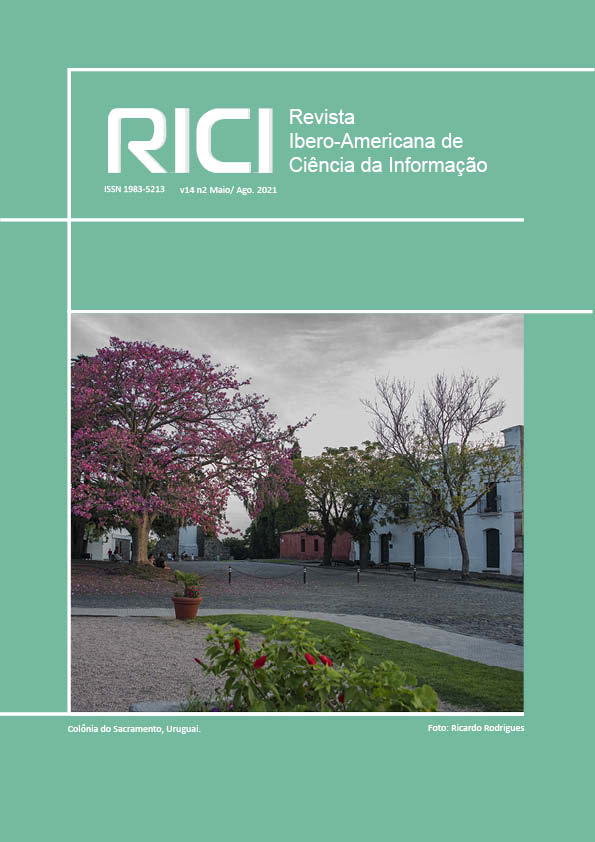Media and information literacy in Sweden: the key to democracy and the role of the librarian as a mediator
DOI:
https://doi.org/10.26512/rici.v14.n2.2021.36503Keywords:
School library, Librarian, Information literacy, Digital skillsAbstract
: Secondary school libraries play a particularly important role in supporting the educational journey of students. Besides the obvious purpose of helping students with their reading and writing skills, high school libraries have become a fundamental part in the development of digital abilities for both students and teachers. As such, media literacy is becoming increasingly necessary in today’s society. The purpose of this article is to analyze the role of the librarian in a social and democratic context alongside the media and information literacy of secondary school youth in Sweden. This study is qualitative and empirical data was collected through document analysis, observation and interviews with three librarians in secondary schools in Sweden. The results of this research conclude that although there is a long way to go (which would require continuous effort) in order to improve and broaden collaboration with all teachers, these librarians have managed to develop an effective pedagogical model structured specifically for working towards media and informational literacy. The Swedish government and educational bodies have allowed the development of projects, laws and initiatives to support librarians and teachers with the purpose of raising youth competency and skills which is necessary in order exercise their role as citizens in a democratic society.
Downloads
References
BOCCIOLESI, E. eBook, re-mediación y e-literacy. Evolución y desarrollo del libro, electrónico en una perspectiva digital. Álabe, Almería, n. 9, ene./jun. 2014. Disponible en: http://revistaalabe.com/index/alabe/article/view/190 Acceso en: 10 jan. 2020.
CARLSSON, U. Medie- och informationskunnighet (MIK) i den digitala tidsåldern. In: CARLSSON, U (red.). Demokratifråga: Kartläggning, analyser, reflektioner. Göteborg: Nordicom, 2018. Disponible en: https://www.nordicom.gu.se/sites/default/files/publikationer-hela-pdf/medie-_och_informationskunnighet_mik_i_den_digitala_tidsaldern_.pdf Acceso en: 10 jan. 2020.
CUERVO, S. Intervención para el desarrollo de la competencia mediática y la decodificación de valores en adolescentes. 2017. Tesis (Doctorado em Psicodidática) - Universidad del País Vasco-Euskal Herriko Unibertsitatea, San Sebastian, 2017. Disponible en: https://core.ac.uk/download/pdf/132350916.pdf Acceso en: 18 Jan. 2020.
DIK. Här är årets Skolbibliotek i världsklass. 2020. Disponible en: https://dik.se/om-oss/pressrum/pressmeddelanden/har-ar-arets-skolbibliotek-i-varldsklass-2020 Acceso en: 18 jan. 2020.
HANSSON, B.; LYNGFELT, A. (red.). Pedagogiskt arbete i teori och praktik: om bibliotekens roll för studenters och doktoranders lärande. Lund: Btj, 2009.
HELL, M. Skolbiblioteksutveckling: Skolutveckling. Lund: Btj, 2011.
RECIO, J. C.; VIGIL, J. M.; ZALDUA, M. La enorme mentira y la gran verdad de la información en tiempos de la postverdad. Scire: Representación Y Organización Del Conocimiento, Zaragoza, v. 23, n. 2, p. 13-23, 2017. Disponible en: https://www.ibersid.eu/ojs/index.php/scire/article/view/4446 Acceso en: 10 jan. 2020.
SVERIGE. Regeringskansliet. Stärkta skolbibliotek och läromedel: Dir. 2019:91. Stockholm, 2019. Disponible en: https://www.regeringen.se/rattsliga-dokument/kommittedirektiv/2019/11/dir.-201991/ Acceso en: 15 Jan. 2020.
SVERIGE. Utbildningsdepartementet. Skollagen (2010:800). Sverige, 2010. Disponible en: https://www.riksdagen.se/sv/dokument-lagar/dokument/svensk-forfattningssamling/skollag-2010800_sfs-2010-800 Acceso en: 15 jan. 2020.
SKOLVERKET. Läroplan, examensmål och gymnasiegemensamma ämnen för gymnasieskola Stockholm. 2011. Disponible en: https://www.skolverket.se/undervisning/gymnasieskolan/laroplan-program-och-amnen-i-gymnasieskolan/laroplan-gy11-for-gymnasieskolan Acceso en: 15 jan. 2020.
STATENS MEDIERÃ…D. Nu går startskottet för MIK-rummet!. Sverige: Cision, 2014. Disponible en: http://news.cision.com/se/statens-medierad/r/nu-gar-startskottet-for-mik-rummet-,c9535679 Acceso en: 10 jan. 2020.
UNITED NATIONS EDUCATIONAL, SCIENTIFIC AND CULTURAL ORGANIZATION (UNESCO). Alfabetización mediática e informacional. Paris, 2011. Disponible en: http://www.unesco.org/new/es/communication-and-information/media-development/media-literacy/mil-as-composite-concept/ Acceso en: 13 jan. 2020.
UNITED NATIONS EDUCATIONAL, SCIENTIFIC AND CULTURAL (UNESCO). Programa de formación en alfabetización mediática e informacional destinado a los docentes. Paris, [2011]. Disponible en: http://www.unesco.org/new/fileadmin/MULTIMEDIA/HQ/CI/CI/pdf/media_and_information_literacy_curriculum_for_teachers_es.pdf Acceso en: 13 jan. 2020.
Downloads
Published
How to Cite
Issue
Section
License
Copyright (c) 2021 Andrea da Silva

This work is licensed under a Creative Commons Attribution 4.0 International License.
Copyright Notice
Authors who publish in this journal agree to the following terms:
- Authors retain copyright and grant the journal right of first publication with the work simultaneously licensed under the Creative Commons Attribution License 4.0, allowing the sharing of work and recognition of the work of authorship and initial publication in this journal.
- Authors are able to take on additional contracts separately, non-exclusive distribution of the version of the paper published in this journal (ex.: distribute to an institutional repository or publish as a book), with an acknowledgment of its initial publication in this journal.
- Authors are permitted and encouraged to distribute their work online (eg.: in institutional repositories or on their website) at any point before or during the editorial process, as it can lead to productive exchanges, as well as increase the impact and citation the published work.
















